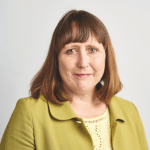Remembering Children’s Names Is Our Teacher Superpower

The sooner you can tell your Paizlees from your Chukas, the easier it will be to start building relationships, says Sue Cowley

- by Sue Cowley
- Author of more than 30 books for educators Visit website

Learning names is part and parcel of the job of being a teacher.
On the first day in September, a sea of children’s faces look up at you from the carpet, and not a single one of them has a name attached to it. By the end of the week you will be able to call everyone by their own names, because learning them quickly is our teacher superpower.
Perhaps you do it by playing name games with the children; maybe by using little memory tricks. But if ever learning all those names feels like a challenge, think yourself lucky you chose to become a primary teacher.
When I taught secondary drama, I often saw over 250 students a week. I would sometimes find myself doing a parents’ evening early in the first term, and not even knowing if the child I was talking about was a boy or a girl.
Names are such an integral part of us – from the day we are born we hear them being used over and over again, typically by the people we love most. It is hardly surprisingly, then, that educators see so much value in remembering and using children’s names. They help you form a bond, let you gain a child’s attention and help you personalise your rewards and give a focus to your consequences. Above all else, using names is a crucial first step on the road to building good relationships with your children.
As a teacher, you get to see how names come in and out of fashion over the years, with favourites often linked to a popular celebrity, bestselling book or royal birth. William is still riding high, George has already made an appearance in the top ten, and Charlotte is quickly rising. There was a sudden outbreak of Harrys a few years back, when the name suffered the double whammy of being the main character in a wildly popular children’s book series, and also the name of a young member of the royal family.
If you do end up with two or more children of the same name in your class, take a moment to consider the best strategy for differentiating between them. If you decide to use a numbering system, pity the child who gets called Harry 2 or (even worse) Harry 3. Even if you didn’t mean it that way, the children will still feel like they are the low budget sequels to the better-regarded original.
Sometimes, you end up teaching children whose names are pronounced the same, but whose parents decided to go for very different spellings. We once had Niamh, Nieve and Neave in our setting, all at the same time. They ended up being affectionately referred to as ‘with an h’, ‘with an i’ and ‘with an a’.
And then there are the parents who come up with something that most of us wouldn’t even recognise as a name. I can only wonder at what the parents of Paizlee, Chuka and Jasminka were thinking when they sat down to discuss what their child should be called. These are all on this year’s list of unusual baby names and will therefore be coming to a classroom near you soon.
Interestingly, names that were once seen as old-fashioned sometimes come back into fashion. A few years ago, the only Evelyn you had heard of might have been the writer with the surname Waugh. Now the name is rising fast in popularity.
Albert and Albie both made it into the top 100 in 2016, as (rather bizarrely) did Ronnie and Reggie. Names also reflect the way that the make-up of our society has changed over time, with the name Muhammad now appearing in the top 20 most popular boys’ names.
Of course, it is not just children’s names that are important. Teachers’ names are used hundreds of times a day by pupils. And unfortunately for some of us, we have to live with a surname that becomes a source of much mirth.
My own surname has been given many impolite variations over the years, but I got away lightly compared to some. I feel very sorry indeed for the teachers called Mrs Topless, Mr Organ and Miss Butt.
Sue Cowley is an author and teacher trainer. Her latest books, Road School and The Artful Educator, are published by Crown House. You can find her at roadschooldiary.co.uk or on Twitter at @sue_cowley.










